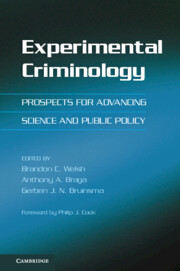Foreword
Published online by Cambridge University Press: 05 June 2014
Summary
We need this new field of experimental criminology. The design of cost-effective policy requires good evidence on what works well and, equally important, what doesn’t. Intuition, casual observation, and good intentions are not enough.
The exceptional case, albeit from another field, helps prove the rule. Cambridge Professor Gordon Smith and his colleague Jill Pell once pointed out that there had been no rigorous evaluations of parachute use as a method of preventing death resulting from jumping out of an airplane. They noted that “advocates of evidence based medicine have criticised the adoption of interventions evaluated by using only observational data” (2003: 1459) and suggested that those advocates participate in a randomized field trial of parachute use. The point is that observational data combined with our understanding of basic mechanisms (gravity, vulnerability to trauma) is entirely persuasive in this case, just as is the usual evidence we have about which switch controls a particular light. But such easy cases are rare. The processes by which innovations in policing or corrections or social policy might influence crime rates are complex and cannot be confidently assessed by what might be called “common sense” alone. More systematic evidence is required. And the new field, well documented in this book, is beginning to provide just that.
- Type
- Chapter
- Information
- Experimental CriminologyProspects for Advancing Science and Public Policy, pp. ix - xiiPublisher: Cambridge University PressPrint publication year: 2013

